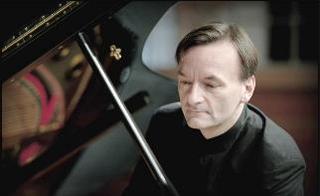|
Back
Mephistopheles and Maelstroms New York
Alice Tully Hall, Lincoln Center
04/13/2014 -
Arnold Schoenberg: Six Little Piano Pieces, Opus 19
Richard Strauss: Stimmungsbilder, Opus 9: “Träumerei”
Richard Wagner: Albumblatt, WWV 94
Anton Bruckner: Erinnerung, WAB 117
Johannes Brahms: Fantasies, Opus 116
Franz Liszt: Sonata in B Minor, S. 178
Stephen Hough (Pianist)

S. Hough (© Sim Canetty-Clarke)
To Londoners, Stephen Hough is famed for almost everything. He is writer, speaker, longtime advocate for gay rights, composer, professor and, oh, yes, one of England’s greatest living pianists.
New Yorkers who don’t happen to read his blogs or articles or books, know him as a concert artist of stunning gifts. But yesterday afternoon, while New Yorkers were enjoying their first flower-blooming Spring day, Mr. Hough presented a program blossomed with rule-breaking sensations.
For one thing, the first half consisted of 17 short pieces–while the second half had one of the longest single movements in piano literature. Three of the five composers are never associated with piano music. And he played their piano pieces. The music was essentially all in one period, the Late Romantic. And finally, he gave a performance of that one Liszt movement, the B Minor Sonata, which almost suicidally poised brilliant emotion with questionable execution and even errors.
Nobody, including this writer, seemed to care about those mistakes.
Mr. Hough’s contemporaries like Marc-André Hamelin have equally eccentric programing, but they often fall into self-deprecating showmanship. Mr. Hough was serious, self-contained, calm, rarely smiled, yet when called for, could be overly emotional. Not, though, for the opening Schoenberg Six Little Pieces, which were played with care, absolute honesty to Schoenberg’s dynamics, and never dry. In fact, one could easily drop these atonal works into the Late Romantic pieces for the rest of the program. If they were tonally futuristic, dynamically they were filled with surprises, emotional shouts and sobs, and Mr. Hough knew how to make them work.
They did not sing, however, which brings me to a relevant anecdote:
I once interviewed an older pianist who told me she had programmed the Six Little Pieces as a challenge, and then realized that she had no feel for them at all. On a whim, she called Mr. Schoenberg, and he offered a solution to her quandary.
“You play Rachmaninoff very well,” he told her. “Pretend that my music is Rachmaninoff, and then simply perform.”
She did, she was successful, but she never put them on a program again.
The following three works were true novelties. None more than three minutes long, all with interchangeable titles (“Memory”, “Album Leaf”, ”Reverie”), and musically interchangeable as well. Except for a few harmonic idiosyncrasies, the Bruckner, Wagner and Strauss piano works sounded much like Grieg and Mendelssohn. Made for the salon, lovely, nostalgic.
Though the Bruckner piece was unique. Instead of the simple A-B-A format, Bruckner took his theme and ran with it, building up monstrous orchestral (or organ-like) phrases the trademark of the composer as symphonist.
Finally we come to the Stephen Hough profile. Or lack of profile. In the late Brahms Fantasies, he played the opening and final capriccios with whirlwind, blazoning speed. Such speed, with the feet on the pedal, made for a sandstorm rather than a hurricane. It was difficult to see the profile through the sounds, difficult to distinguish that this was Brahms at all. It was simply a tumult of blurred sounds, uncharacteristically smudged fingerings.
Oh, the Intermezzi were wondrously played. When he gave pause, not only did Mr. Hough display the most beautiful tone and understanding, but he gave us elegiac respite from the storm.
I loved the last half of the program, for no matter how Liszt’s B Minor Sonata is played by a master, something new and wonderful is offered. Liszt may have written bombast more often than not, but he was a creature of literature, and this “Faust” sonata is a dramatic masterwork.
In a way, he played the B Minor like he did Brahms Capriccios. His foot was on the pedal more often than not. For the first descending notes, that gave an eerie haunting introduction. And that same ghostly start worked itself into the dramatic moments. Above all, one must emphasize the word “dramatic”. For if Brahms’ “abstract” music lost its individual profile, the Liszt, with the same furious fingerwork, blasted through with, with as much Gothic as Goethe-ic drama.
This was not music, it was songless opera, the theater of acoustics, a classic tome of roars and caresses, cataclysmic chords and tender lyrics. No, I wouldn’t want to listen to this on a recording, for the errors in the inner voices might be too apparent. But Mr. Hough played it with such aggression, such fevered frenzy, that one really did feel one was experiencing drama. Though I thought of Lear on the heath, rather than Faust in his absorption.
Pianists in the audience may have questioned the execution. The rest of us sat back and enjoyed the show.
Two of Mr. Hough’s three encores, preceding the Chopin F-Sharp Nocturne, gave an indication of his heart. He didn’t announce their titles (though the first started with a quote from Tosca’s “Vissi d’arte”), but they were both romantic, a bit lackadaisical and charming.
In other words, though we hardly needed it, a respite from his mammoth version of Liszt’s Mephistophelean sonata.
Harry Rolnick
|